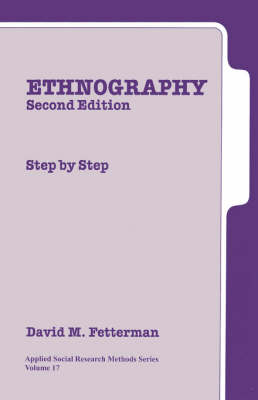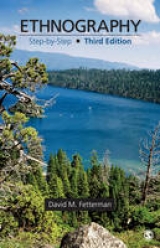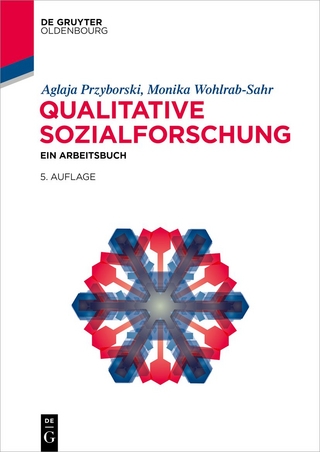
Ethnography
SAGE Publications Inc (Verlag)
978-0-7619-1385-6 (ISBN)
- Titel erscheint in neuer Auflage
- Artikel merken
Retained from the First Edition is coverage of: the nature of field work; the equipment needed to conduct research; the analysis of data; the differences and similarities between qualitative and quantitative approaches; and writing the report.
David M. Fetterman is the President and CEO of Fetterman & Associates, an international ethnographic and evaluation consultation firm. He works in a wide range of settings, ranging from townships in South Africa to Google in Silicon Valley. Clients and sponsors include: the U.S. Department of Education, W. K. Kellogg Foundation, Hewlett Foundation, Hewlett Packard Philanthropy, John S. and James L. Knight Foundation, and Arkansas Department of Education. David has also provided consultation services for the: Ministry of Education in Japan, Ministry of Health in Brazil, Ministry of Health in Ethiopia, and Te Puni Kokiri (Ministry of Māori Development) in New Zealand. He concurrently serves as a member of the faculty at Pacifica Graduate Institute and the University of Charleston. Dr. Fetterman has over 25 years of experience at Stanford University. He was a Consulting Professor of Education in the School of Education and the Director of Evaluation in the School of Medicine at Stanford University. Formerly, he served as a Professor and Research Director at the California Institute of Integral Studies, Principal Research Scientist at the American Institutes for Research, and a Senior Associate and Project Director at RMC Research Corporation. He received his PhD from Stanford University in educational and medical anthropology. David is a past-president of the American Anthropological Association’s Council on Anthropology and Education and the American Evaluation Association. He is a Fellow of the American Anthropological Association and the Society for Applied Anthropology. David received the Top Anthropologist of the Year 2019 Award; George and Louise Spindler Award, for outstanding contributions to educational anthropology; and the Ethnographic Evaluation Award. He also received the Paul Lazarsfeld Award for Outstanding Contributions to Evaluation Theory and the Myrdal Award for Cumulative Contributions to Evaluation Practice—the American Evaluation Association’s highest honors. Fetterman has contributed to a variety of encyclopedias and is the author of Ethnography: Step by Step; Excellence and Equality: A Qualitatively Different Perspective on Gifted and Talented Education; and Empowerment Evaluation in the Digital Villages: Hewlett-Packard’s $15 Million Race Toward Social Justice. Dr. Fetterman is the editor of: Ethnography in Educational Evaluation; Educational Evaluation: Ethnography in Theory, Practice, and Politics; Speaking the Language of Power: Communication, Collaboration, and Advocacy (translating ethnography into action); Qualitative Approaches to Evaluation in Education: The Silent Scientific Revolution; Empowerment Evaluation: Knowledge and Tools for Self-assessment, Evaluation Capacity Building, and Accountability; Empowerment Evaluation Principles in Practice; and Foundations of Empowerment. (Details of the projects are available at http://www.drdavidfetterman.com.).
PART ONE: THE FIRST STEP: AN OVERVIEW
The Problem
Basic or Applied Role
Theory
Research Design
Fieldwork
Formal Analysis
The Ethnography
Book Organization
PART TWO: WALKING IN RHYTHM: ANTHROPOLOGICAL CONCEPTS
Culture
Holistic Perspective
Contextualization
Emic Perspective and Multiple Realities
Etic Perspective
Nonjudgmental Orientation
Inter-and Intracultural Diversity
Structure and Function
Symbol and Ritual
Micro- or Macrolevel Study
Operationalism
PART THREE: A WILDERNESS GUIDE: METHODS AND TECHNIQUES
Fieldwork
Selection and Sampling
Entry
Participant Observation
Interviewing
Lists and Forms
Questionnaires
Projective Techniques
Additional Eliciting Devices
Unobtrusive Measures
PART FOUR: GEARING UP: ETHNOGRAPHIC EQUIPMENT
Pen and Paper
Tape Recorder
Cameras
Videotape
Cinema
Computers
Laptop and Desktop
The Internet
Data Collection Software
Virtual Office and File Sharing
Database Software
Printers and Speakers
PART FIVE: FINDING YOUR WAY THROUGH THE FOREST: ANALYSIS
Thinking
Triangulation
Patterns
Key Events
Maps
Flowcharts
Organizational Charts
Matrices
Content Analysis
Statistics
Crystallization
PART SIX: RECORDING THE MIRACLE: WRITING
Research Proposals
Field Notes
Field Note Organization
Memoranda
Interim Reports
Final Reports, Articles and Books
Thick Description and Verbatim Quotations
Ethnographic Present
Ethnographic Presence
Ethnographically Informed Reports
Literature
Revising and Editing
PART SEVEN: WALKING SOFTLY THROUGH THE WILDERNESS: ETHICS
The Ethnographer′s Role
Academic and Applied Ethnography
Research Life Cycle
Conclusion
| Erscheint lt. Verlag | 5.2.1998 |
|---|---|
| Reihe/Serie | Applied Social Research Methods |
| Verlagsort | Thousand Oaks |
| Sprache | englisch |
| Maße | 139 x 215 mm |
| Themenwelt | Sozialwissenschaften ► Ethnologie |
| Sozialwissenschaften ► Soziologie ► Empirische Sozialforschung | |
| ISBN-10 | 0-7619-1385-8 / 0761913858 |
| ISBN-13 | 978-0-7619-1385-6 / 9780761913856 |
| Zustand | Neuware |
| Haben Sie eine Frage zum Produkt? |
aus dem Bereich



